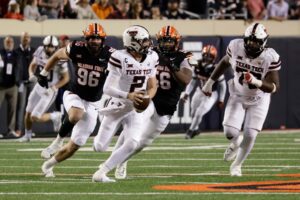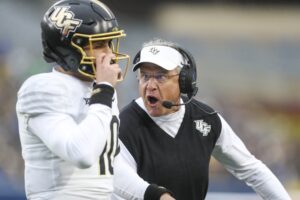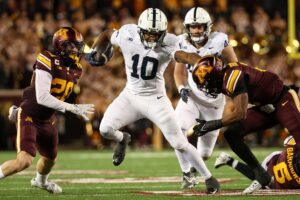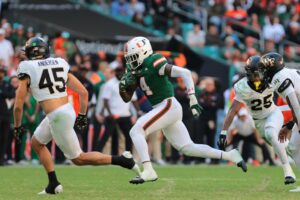Remembering Murph Tinsley
“Almost heaven, West Virginia,
Blue Ridge Mountains, Shenandoah River,
Life is old there, older than the trees,
Younger than the mountains, growin’ like a breeze.”-John Denver, “Country Roads
As a Mountaineer fan, chances are you sang those words (and more) before going further. After all, John Denver’s hit represents the musical personification of the bond among West Virginia fans. I played it repeatedly while reflecting on the life of a man who represented the physical manifestation of the bond between West Virginia fans and their team. As I contemplated how to tell a story that begins and ends with the country roads that took Murphy “Murph” Tinsley home fifteen months ago, I thought this was the most appropriate soundtrack for remembering Murphy Tinsley.
Remembering Murph Tinsley: Not Just A Cameraman
Unfortunately, I only knew Murph as the man who operated the field camera behind the south end zone at Milan Puskar Stadium for decades. Indeed, he manned that camera for all but two games over 36 consecutive seasons. The truth, however, is simple: Murph was far more than “just a cameraman.”
Undoubtedly, he gained his deserved professional reputation as a cameraman and archivist of film. At the time of his death, in fact, he had thousands of hours of film archived at his home. More importantly, however, Murph captured and archived the people and stories of West Virginia with every personal interaction. In the process, he glued together the fanbase with the team he spent nearly 40 years filming.
Remembering Murph Tinsley: Modest Beginning

Murph (on left) with brother, Joe Tinsley, during childhood.
(Photo courtesy Joe Tinsley family archives).
Murph’s story begins in St. Albans, where he was raised with his brother Joe “E.I.” Tinsley. Joe tells me that their mom “never knew a stranger and always put others first.” By all accounts, Murph carried this trait forward in myriad ways. Fighting back a well of tears, Joe recalled talking to Murph every weekend and talking “often about his beloved Mountaineers, and sports, and politics.” Joe also recalled the hundreds of conversations he had with those who surrounded Murph on a daily basis. “Everybody loved him,” Joe declared.
Indeed, Murph positively impacted countless people over his life. Joe, mind you, makes his own positive impact on this world. He works at Orlando Regional Medical Center as a respiratory therapist, maintaining responsibility for ongoing treatment of hospitalized COVID patients. Still, he vividly recalls the sense of awe he felt when learning more about Murph’s influence.
Taking Up The Camera
Murph graduated from WVU’s Persley Isaac Reed School of Journalism many years ago. After that, he hung around with West Virginia Public Broadcasting for, John Nakashima quipped, “about five years” as an intern waiting for a job opening. Shortly thereafter, Murph took his post manning his field camera. He developed quick rapport with everyone fortunate enough to meet him, including the team and coaches he set out to film. As a result, despite being the man behind the camera, he quickly became an integral part of the lifeblood of West Virginia football.
Murph’s career as a fixture of Mountaineer football, however, began years before. His former roommate, Mountaineer great Tim Agee, recalled their time together. “[Murph] brought that pinball machine over, [and] we had epic battles.” During Murph’s memorial, Agee added that Murph was “true gold and blue, through and through.” A Mountaineer hall of famer himself, Agee’s parting words to Murph? “My hall-of-famer behind the camera, rest in peace.”
Modest Ending
“Country roads, take me home,
To the place I belong,
West Virginia, mountain mama,
Take me home, country roads.”
On November 9, 2019, Murph passed away in a hospital room overlooking his beloved Mountaineers as they played (and lost) to Texas Tech. Despite best efforts through multiple surgeries over five days, the doctors at Ruby Memorial unfortunately could not stay ahead of the infection that plagued Murph. Ultimately, West Virginia lost much more than a game that day.
In his final days, Murph received visits, calls, and texts by the hundreds from his Mountaineer family. Former West Virginia linebacker Marc Magro stood out among those who visited Murph in his final days. Magro recalled that his family would host Murph for dinner often, “Murph was family for us, and we were family for him.”
During the memorial, former Mountaineer defensive back Willie Edwards said it best: “Murph knew your story.” And not just the surface. Murph took the time to learn who people were, where they were from, and what they were about. Edwards even pondered, “I always wondered how did have all that time.”
“Murph Just Cared About People”
What impressed Magro most was how Murph just “met us where we were at in our walks.” He gave of himself more than he expected from others. Simply, “Murph just cared about people.” Magro told those at Murph’s service that “in the brotherhood of football, we weren’t shy about telling each other we loved each other.” Murph was no exception to that rule.
In fact, Edwards remarked that he could not even recall when Murph came into his life: “Somehow, he just showed up in my life.” And he recalled both fondly and sadly that after just the third time they talked that Murph concluded with an “I love you, Willie.” Edwards joked that, after that, he always tried to be the first to say those words, but Murph “always beat [him] to the punch.”
Remembering Murph Tinsley: His Mountaineer Family
Another Mountaineer legend, Grant Wiley, said during his remarks on Murph’s memorial video that “the last message I received from Murph was ‘I love you.’” Simple, yet effective. Wiley added that Murph, “Never hesitated to express how much we all meant to him,” and that Murph, “Always put us first.”
Other legends, like Owen Schmitt and Quincy Wilson, echoed the sentiment. Same with Pat White, who called Murph, “One of the most uplifting spirits I’ve ever come across.” White concluded with a common refrain about Murph when he said, “every time we’ve ever had any interactions, it was like I was speaking to my family.”
Indeed, he was such an integral part of the family that Edwards said, as players and alumni, “The first thing we did when we got on the field was go to [his] camera and talk to Murph.” That is telling. Players did not look first to their coaches, or their fans, or their trainers. No, they went to see Murph before any of that. Schmitt added “it’ll be hard not seeing you there on Saturdays.”
The Glue: Not Just the Team He Filmed
Though glowing comments about Murph pour in from a veritable Who’s Who of Mountaineer football history, Magro made sure to add this important note. Murph had the very same kind of “Close friendships with people you’ve never heard of.” For a man who never knew a stranger, this, of course, is not surprising.
But the net was cast wide. Nakashima told attendees at Murph’s memorial that he,“Would never attack the downtrodden” and that when he spoke, it was clear that, “To Murph, nothing was sacred except for sports.” That allowed him to bond with people of all types.
Joe told me that people from all walks of life knew and loved Murph every bit as much as the football team did. When Joe worked to resolve the business details of his brother’s life, everyone he called knew Murph. From Murph’s own funeral director, to the broker insuring Murph’s home, to the local prosecutor—they all knew Murph. And they all told the same story. Murph had a big heart, and he laid his soul bare for all to see.
Archiving More Than The Game
Perhaps the most powerful comments at his memorial came from Leigh Limerick. She said, “His whole life was archiving, and he was very sentimental. And he was generous, and he was thoughtful, and he was kind. And he never forgot anyone’s name, or their story.” There, again, we see that theme: Murph absorbed the vital details of every person he touched.
Leigh summed up that Murph had “the biggest heart of anyone they’d ever known.” And she told his brother, “Joe, you arrived this week thinking you were the last of your line. And, while I guess that’s technically correct, just know that we were all his family.” And that, in a nutshell, is what Murph set out to do. He never met a stranger, and whether it was Pat White or Joe the Plumber, Murph made everyone around him feel like family. In that way, he really was the glue—the bridge—between the people of West Virginia and the team he filmed.
Remembering Murph Tinsley: The Mentor

A young Pat McAfee spends time with children at Ruby Memorial. (Photo courtesy Murphy Tinsley’s family archives.
Even professionally, Murph was more than just the fellow who manned the camera. One line in particular from Murph’s obituary resonates loudly, “Anyone who encountered Murph was ultimately his pupil.” In this way, not only did Murph take his own snapshot of those he knew for his archive, but he also gave much back in return.
Just ask Pat McAfee, the most visible of the Mountaineer football alumni that he impacted. During Murph’s memorial, McAfee delivered a personal statement by video. He said, “I’m coming to you live from my studio, which is something I would have never dreamed about whenever I got to West Virginia.” McAfee says of himself that he “had no goals [and] no aspirations to get into this sports entertainment world.”
Influencing A Career
What changed? Simply, McAfee met Murph. He said, “Murph convinced me that I should do an internship at MSN (Mountaineer Sports Network) to learn about this business.” Emotionally, he added that Murph “had faith in me before I had faith in myself.” Indeed, Murph “saw something” in McAfee “before [he] had any idea.” After spending countless hours together with Murph editing, producing, creating, and talking, McAfee said of the experience that he had an invaluable opportunity “to learn about a man that’ll never get the respect that he should.”
This is but one example. There are many more. But this says a lot. Without Murph, McAfee himself admits that there would be no Pat McAfee Show. The fanbase would not have such a high-profile personality to keep Mountaineer Nation visible in the spotlight. That is simply another way that Murph put his own stamp on the world he documented and archived so well. And Pat says that “every time I speak in front of a camera, Murph knows none of this would be happening without him.”
Remembering Murph Tinsley: Murph Landing
“All my memories, gather round her,
Miners’ lady, stranger to blue water,
Dark and dusty, painted on the sky,
Misty taste of moonshine, teardrop in my eye.”

Murphy Tinsley’s home now serves as a guest house for visitors to Morgantown. (Photo courtesy Joe Tinsley family archives).
Rasheed Marshall also told those present at Murph’s memorial that Murph “had such a passion for being behind the camera capturing our moments as athletes.” Murph did that job to perfection. He captured the best and worst moments, and all of those in between. He captured defeat. And he captured victory, both large and small, not only in football, but in life.
Based on what others say about him, it is clear that Murph was exceptional at his job for one reason above all others. He cared about the people, enough to go well beyond the surface and get to know who those people were. As a result, Murph was able to capture not just the moments on the field, but the passion and grit and stories behind those moments. And by capturing them with such a deft touch, Murph bridged those athletes and their fans.
Retiring Murph Tinsley
According to Joe, Murph’s camera stand has now been removed and retired. Just think about that for a moment. West Virginia has a notoriously high bar to retire anything. The Mountaineer football program has retired only two jersey numbers in its history, those of Ira Rodgers and Sam Huff. Murph did an oft-overlooked job so well that his post will never be filled.
And while the archival mind of Murph is no longer with us, many pieces of him live on. In fact, his family renovated Murph’s home and adorned it with archival images taken by him through his storied career and plenty of Mountaineer memorabilia. The home, which is available for rent by those who want to stay in Morgantown for a few days (or a few weeks), stands as a physical reminder of the life of a man who, I hope, ultimately does get the respect he deserves. In the words of Wilson, Murph, there is “no greater Mountaineer than you, my man.” Indeed, Murph is the perfect blue collar story to represent our blue collar family.

Murphy Tinsley braces for impact from an incoming runner. (Photo courtesy Murphy Tinsley’s family archives).
“Take me home, country roads,
Country roads, take me home,
To the place I belong,
West Virginia, mountain mama,
Take me home, country roads,
Take me home, down country roads.






